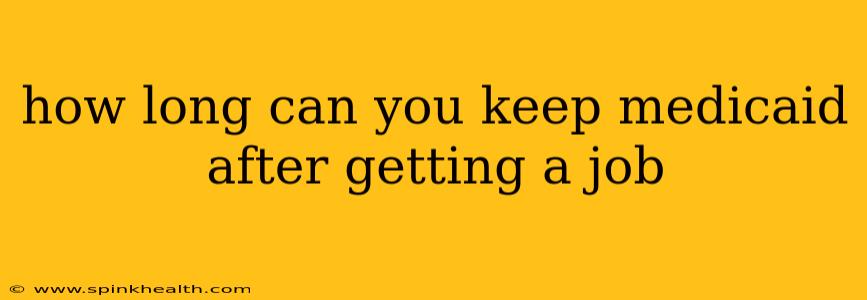How Long Can You Keep Medicaid After Getting a Job? Navigating the Complexities of Employment and Healthcare Coverage
The question of how long you can keep Medicaid after getting a job is a common one, and unfortunately, there's no single, simple answer. The rules governing Medicaid eligibility are complex and vary significantly from state to state. Imagine it like this: each state has its own unique recipe for Medicaid eligibility, using different ingredients (income limits, asset limits, etc.) in varying proportions.
This makes your journey to understanding your eligibility a personal one, dependent on your specific circumstances and the rules in your state. Let's unravel some of the complexities and explore common scenarios.
H2: What Factors Determine Medicaid Eligibility After Employment?
Several key factors influence how long you can maintain your Medicaid coverage after starting a job:
- Your State's Medicaid Program: This is the most significant variable. Some states have more generous Medicaid programs offering longer coverage periods after employment, while others are stricter. Many states have implemented continuous coverage provisions to avoid disruptions in healthcare during employment transitions, which we will delve into further below.
- Your Income: Once employed, your income will be the primary determinant of your continued eligibility. Medicaid programs generally have income limits, and if your income exceeds these limits, you'll likely lose coverage. The threshold varies greatly by state and family size.
- Your Family Size: The number of people in your household significantly impacts your eligibility. Larger families often have higher income limits than single individuals.
- Your Assets: Some states also consider the value of your assets when determining Medicaid eligibility. This factor can impact eligibility even if your income is within the limits.
- Your Employment Status: The type of employment matters, specifically whether you're part-time or full-time. Part-time employment may be less likely to immediately disqualify you from coverage depending on your total income.
- The "Continuous Coverage" Provision: In recent years, many states have taken steps to ensure that Medicaid beneficiaries aren't abruptly kicked off coverage after finding employment. These initiatives often allow for a period of continuous coverage, even as income increases, to facilitate smoother transitions and prevent healthcare disruptions.
H2: What Happens to Your Medicaid When You Start a Job?
When you begin a new job, it's crucial to report this change in your circumstances to your state's Medicaid agency promptly. Failure to do so can lead to penalties. They will then reassess your eligibility based on your new income and other relevant factors. They will determine if your income is still within the threshold to maintain coverage.
H2: How Can I Find My State's Specific Medicaid Rules?
This is the most important step. Generic information is insufficient. You need to contact your state's Medicaid agency directly. Their website will provide detailed information on eligibility requirements, income limits, and the process for reporting changes in circumstances. Most state Medicaid websites have user-friendly resources and contact information.
H2: What if I Lose My Medicaid? What are My Other Options?
If you lose your Medicaid coverage due to increased income from your new job, you may be eligible for other affordable healthcare options, such as:
- Employer-Sponsored Health Insurance: Many employers offer health insurance benefits as part of their compensation package. Explore this option.
- The Affordable Care Act (ACA) Marketplace: This allows you to purchase a health insurance plan that fits your budget and needs. You might qualify for subsidies to lower your costs.
H2: Can I Maintain Medicaid Coverage Even With a Higher Income?
In some states, with continuous coverage or similar programs, you might be able to maintain Medicaid coverage even with a higher income than you previously had. This usually involves a gradual transition period, allowing some time to adjust to your new financial situation before losing coverage. But this is state-dependent and needs to be verified with your local authorities.
H2: What if I'm Self-Employed?
If you are self-employed, reporting income changes can be more complex. You’ll need to accurately report your income to Medicaid, usually providing documentation such as tax returns or profit/loss statements. The agency will then assess your eligibility based on your reported self-employment income.
In Conclusion:
The duration of Medicaid coverage after employment is highly variable and depends entirely on your individual circumstances and your state’s Medicaid program. Proactive communication with your state's Medicaid agency is vital to understanding your rights and ensuring a smooth transition. Don't hesitate to seek clarification; your healthcare access is crucial.

